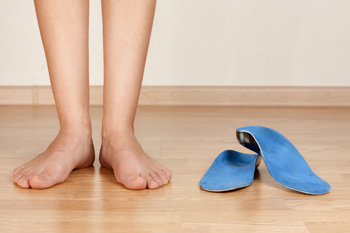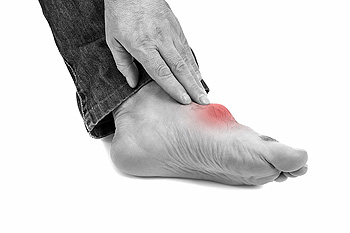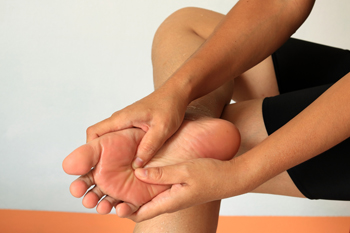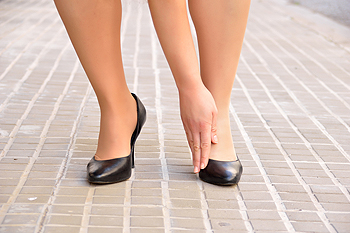October 2020
Are You Suffering From Ingrown Toenails?
Should I Get Orthotics?
 Orthotics are devices made of molded rubber, leather, metal, plastic, or other synthetic material that are placed into the shoes in order to balance the foot in a neutral position and cushion it. A podiatrist may recommend or prescribe a custom orthotic if you have specific foot problems, such as an unusually shaped foot or over pronated feet when walking. They may also be prescribed to help with foot pain caused by medical conditions such as diabetes, plantar fasciitis, and arthritis. If you don’t necessarily want to invest in an expensive custom-made orthotic, drugstores, supermarkets, and sporting goods stores all sell generic orthotics which may help relieve general foot pain. For more information about orthotics, speak with a podiatrist today.
Orthotics are devices made of molded rubber, leather, metal, plastic, or other synthetic material that are placed into the shoes in order to balance the foot in a neutral position and cushion it. A podiatrist may recommend or prescribe a custom orthotic if you have specific foot problems, such as an unusually shaped foot or over pronated feet when walking. They may also be prescribed to help with foot pain caused by medical conditions such as diabetes, plantar fasciitis, and arthritis. If you don’t necessarily want to invest in an expensive custom-made orthotic, drugstores, supermarkets, and sporting goods stores all sell generic orthotics which may help relieve general foot pain. For more information about orthotics, speak with a podiatrist today.
If you are having discomfort in your feet and would like to try orthotics, contact Dr. Scott Shrem from Garden State Foot & Ankle Center. Our doctor can provide the care you need to keep you pain-free and on your feet.
What Are Orthotics?
Orthotics are inserts you can place into your shoes to help with a variety of foot problems such as flat feet or foot pain. Orthotics provide relief and comfort for minor foot and heel pain but can’t correct serious biomechanical problems in your feet.
Over-the-Counter Inserts
Orthotics come in a wide variety of over-the-counter inserts that are used to treat foot pain, heel pain, and minor problems. For example, arch supports can be inserted into your shoes to help correct overarched or flat feet, while gel insoles are often used because they provide comfort and relief from foot and heel pain by alleviating pressure.
Prescription Orthotics
If over-the-counter inserts don’t work for you or if you have a more severe foot concern, it is possible to have your podiatrist prescribe custom orthotics. These high-quality inserts are designed to treat problems such as abnormal motion, plantar fasciitis, and severe forms of heel pain. They can even be used to help patients suffering from diabetes by treating foot ulcers and painful calluses and are usually molded to your feet individually, which allows them to provide full support and comfort.
If you are experiencing minor to severe foot or heel pain, it’s recommended to speak with your podiatrist about the possibilities of using orthotics. A podiatrist can determine which type of orthotic is right for you and allow you to take the first steps towards being pain-free.
If you have any questions please contact our office located in Hazlet, NJ . We offer the newest diagnostic and treatment technologies for all your foot and ankle needs.
How Is Gout Diagnosed?
 Gout is a type of arthritis that is caused by a buildup of urate crystals in the joints and often affects the joints of the feet. Gout flare ups can be painful and cause inflammation, redness, and swelling. This condition is typically diagnosed by a joint fluid test, where the doctor extracts fluid from the affected joint with a needle and examines it for the presence of urate crystals. Joint infections can cause the same symptoms as gout, so a doctor might also check the fluid for the presence of any bacteria. The doctor can also do a blood test to measure the level of uric acid in the blood or use an ultrasound to search for urate crystals around the joints. If you suspect that you may have gout, please see a podiatrist for a proper diagnosis and treatment options.
Gout is a type of arthritis that is caused by a buildup of urate crystals in the joints and often affects the joints of the feet. Gout flare ups can be painful and cause inflammation, redness, and swelling. This condition is typically diagnosed by a joint fluid test, where the doctor extracts fluid from the affected joint with a needle and examines it for the presence of urate crystals. Joint infections can cause the same symptoms as gout, so a doctor might also check the fluid for the presence of any bacteria. The doctor can also do a blood test to measure the level of uric acid in the blood or use an ultrasound to search for urate crystals around the joints. If you suspect that you may have gout, please see a podiatrist for a proper diagnosis and treatment options.
Gout is a foot condition that requires certain treatment and care. If you are seeking treatment, contact Dr. Scott Shrem from Garden State Foot & Ankle Center. Our doctor will treat your foot and ankle needs.
What Is Gout?
Gout is a type of arthritis caused by a buildup of uric acid in the bloodstream. It often develops in the foot, especially the big toe area, although it can manifest in other parts of the body as well. Gout can make walking and standing very painful and is especially common in diabetics and the obese.
People typically get gout because of a poor diet. Genetic predisposition is also a factor. The children of parents who have had gout frequently have a chance of developing it themselves.
Gout can easily be identified by redness and inflammation of the big toe and the surrounding areas of the foot. Other symptoms include extreme fatigue, joint pain, and running high fevers. Sometimes corticosteroid drugs can be prescribed to treat gout, but the best way to combat this disease is to get more exercise and eat a better diet.
If you have any questions please feel free to contact our office located in Hazlet, NJ . We offer the newest diagnostic and treatment technologies for all your foot and ankle needs.
Lack of Feeling in the Feet
 Peripheral neuropathy is a condition that can cause weakness and a lack of feeling in the feet and lower extremity regions. There are different factors that can lead to the development of peripheral neuropathy such as diabetes, autoimmune diseases, a vitamin deficiency, and hormonal imbalances. Indicators that you may have developed this condition can include tingling or numbness, muscle weakness or twitching, and an inability to feel pain, touch, or temperature. To help treat neuropathy, some have found it helpful to partake in physical therapy, adopting a healthier lifestyle, and practicing better eating habits. For a proper diagnosis and suggested treatment plan, please consult with a podiatrist.
Peripheral neuropathy is a condition that can cause weakness and a lack of feeling in the feet and lower extremity regions. There are different factors that can lead to the development of peripheral neuropathy such as diabetes, autoimmune diseases, a vitamin deficiency, and hormonal imbalances. Indicators that you may have developed this condition can include tingling or numbness, muscle weakness or twitching, and an inability to feel pain, touch, or temperature. To help treat neuropathy, some have found it helpful to partake in physical therapy, adopting a healthier lifestyle, and practicing better eating habits. For a proper diagnosis and suggested treatment plan, please consult with a podiatrist.
Neuropathy
Neuropathy can be a potentially serious condition, especially if it is left undiagnosed. If you have any concerns that you may be experiencing nerve loss in your feet, consult with Dr. Scott Shrem from Garden State Foot & Ankle Center. Our doctor will assess your condition and provide you with quality foot and ankle treatment for neuropathy.
What Is Neuropathy?
Neuropathy is a condition that leads to damage to the nerves in the body. Peripheral neuropathy, or neuropathy that affects your peripheral nervous system, usually occurs in the feet. Neuropathy can be triggered by a number of different causes. Such causes include diabetes, infections, cancers, disorders, and toxic substances.
Symptoms of Neuropathy Include:
- Numbness
- Sensation loss
- Prickling and tingling sensations
- Throbbing, freezing, burning pains
- Muscle weakness
Those with diabetes are at serious risk due to being unable to feel an ulcer on their feet. Diabetics usually also suffer from poor blood circulation. This can lead to the wound not healing, infections occurring, and the limb may have to be amputated.
Treatment
To treat neuropathy in the foot, podiatrists will first diagnose the cause of the neuropathy. Figuring out the underlying cause of the neuropathy will allow the podiatrist to prescribe the best treatment, whether it be caused by diabetes, toxic substance exposure, infection, etc. If the nerve has not died, then it’s possible that sensation may be able to return to the foot.
Pain medication may be issued for pain. Electrical nerve stimulation can be used to stimulate nerves. If the neuropathy is caused from pressure on the nerves, then surgery may be necessary.
If you have any questions, please feel free to contact our office located in Hazlet, NJ . We offer the newest diagnostic and treatment technologies for all your foot care needs.
Wearing High Heels May Contribute To Certain Foot Conditions
 When high heels are frequently worn, it may lead to the development of various foot conditions. These foot ailments can include plantar fasciitis, bunions, corn and calluses, or hammertoes. Patients who choose to have surgery performed may find wearing high heels to be more comfortable afterward, despite the fact that wearing this type of shoe may have initially caused the pain and discomfort. When high heels are worn, it can be easier for the ankle to twist, which may result in a fracture or sprain. It is generally suggested to wear flat shoes after surgery, and once flexibility, range of motion, and strength in the feet are restored, the body and feet can be more prepared to wear heels again. If you would like additional information about foot conditions that may be caused from wearing high heels, please consult with a podiatrist.
When high heels are frequently worn, it may lead to the development of various foot conditions. These foot ailments can include plantar fasciitis, bunions, corn and calluses, or hammertoes. Patients who choose to have surgery performed may find wearing high heels to be more comfortable afterward, despite the fact that wearing this type of shoe may have initially caused the pain and discomfort. When high heels are worn, it can be easier for the ankle to twist, which may result in a fracture or sprain. It is generally suggested to wear flat shoes after surgery, and once flexibility, range of motion, and strength in the feet are restored, the body and feet can be more prepared to wear heels again. If you would like additional information about foot conditions that may be caused from wearing high heels, please consult with a podiatrist.
High heels have a history of causing foot and ankle problems. If you have any concerns about your feet or ankles, contact Dr. Scott Shrem from Garden State Foot & Ankle Center. Our doctor can provide the care you need to keep you pain-free and on your feet.
Effects of High Heels on the Feet
High heels are popular shoes among women because of their many styles and societal appeal. Despite this, high heels can still cause many health problems if worn too frequently.
Which Parts of My Body Will Be Affected by High Heels?
- Ankle Joints
- Achilles Tendon – May shorten and stiffen with prolonged wear
- Balls of the Feet
- Knees – Heels cause the knees to bend constantly, creating stress on them
- Back – They decrease the spine’s ability to absorb shock, which may lead to back pain. The vertebrae of the lower back may compress.
What Kinds of Foot Problems Can Develop from Wearing High Heels?
- Corns
- Calluses
- Hammertoe
- Bunions
- Morton’s Neuroma
- Plantar Fasciitis
How Can I Still Wear High Heels and Maintain Foot Health?
If you want to wear high heeled shoes, make sure that you are not wearing them every day, as this will help prevent long term physical problems. Try wearing thicker heels as opposed to stilettos to distribute weight more evenly across the feet. Always make sure you are wearing the proper shoes for the right occasion, such as sneakers for exercising. If you walk to work, try carrying your heels with you and changing into them once you arrive at work. Adding inserts to your heels can help cushion your feet and absorb shock. Full foot inserts or metatarsal pads are available.
If you have any questions please feel free to contact our office located in Hazlet, NJ . We offer the newest diagnostic and treatment technologies for all your foot and ankle needs.
Blog Archives
- April 2025
- March 2025
- February 2025
- January 2025
- December 2024
- November 2024
- October 2024
- September 2024
- August 2024
- July 2024
- June 2024
- May 2024
- April 2024
- March 2024
- February 2024
- January 2024
- December 2023
- November 2023
- October 2023
- September 2023
- August 2023
- July 2023
- June 2023
- May 2023
- April 2023
- March 2023
- February 2023
- January 2023
- December 2022
- November 2022
- October 2022
- September 2022
- August 2022
- July 2022
- June 2022
- May 2022
- April 2022
- March 2022
- February 2022
- January 2022
- December 2021
- November 2021
- October 2021
- September 2021
- August 2021
- July 2021
- June 2021
- May 2021
- April 2021
- March 2021
- February 2021
- January 2021
- December 2020
- November 2020
- October 2020
- September 2020
- August 2020
- July 2020
- June 2020
- May 2020
- April 2020
- March 2020
- February 2020
- January 2020
- December 2019
- November 2019
- October 2019
- September 2019
- August 2019
- July 2019
- June 2019
- May 2019
- April 2019
- March 2019
- February 2019
- January 2019
- December 2018
- November 2018
- October 2018
- September 2018
- August 2018
- July 2018
- June 2018
- May 2018
- April 2018
- March 2018









